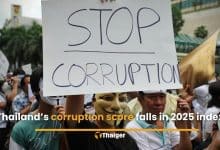Harbour hubbub: Nakhon Phanom office sinks in sand scandal, draining Thai govt’s revenue

In one of its latest controversies, the Harbour Office at Nakhon Phanom is allegedly involved in illicit aid towards sand dredging business owners, causing significant revenue loss to the Thai government. A leaked conversation reportedly revealed that the Harbour director purportedly leveraged legal loopholes to aid the said business owners by contravening sand dredging regulations in the Mekong River.
Reporters yesterday embarked on a journey to Nakhon Phanom, a province in northeastern Thailand, after receiving tips about the Harbour Office’s Nakhon Phanom branch providing undue assistance to sand dredging businesses that were allegedly exploiting legal loopholes. Stories of these illegal activities first emerged after locals raised concerns about non-compliance with sand dredging regulations.
Following the allegations, Nakhon Phanom’s Provincial Governor, Wanchai Chanpron, seized the moment by urging security departments amongst other agencies to make a site visit, enforce the law and avert unjust utilisation of natural resources, tax evasion and any undue advantage gained.
The situation escalated when audio clips of a secretive deal involving a person claiming to be the Harbour Director surfaced on social media. The conversation involved negotiations with a Mekong sand dredger in Tha Uthen district, Nakhon Phanom, and sparked a nationwide sensation.
It is believed that the culprit behind this could be a business owner who was treated unfairly by the Harbour Office. Unable to stomach such behaviours and the exploitation of legal loopholes, the business owner decided to leak the audio clips.
More recently, the situation continued to unfold in social media circles with a second volley of audio clips being leaked. The clips shed light on a conversation where the individual, purportedly the Harbour director, offered his assistance to the sand dredgers while name-dropping a well-known political figure, potentially reflecting his ability to directly converse with a retired Royal Thai Navy commander, reported Sanook.
It appears that the discussions and notions about the expected transfers of local security officials in October will allegedly lead to the provincial governor of Nakhon Phanom being transferred, including the assistant director of the Internal Security Operations Command in Nakhon Phanom Province. This will ultimately create a window for the Harbour director to facilitate the smooth approval of sand dredging in the upcoming season starting November 1.
In response to this mounting crisis, the Provincial Governor of Nakhon Phanom, Wanchai Chanpron, coordinated an investigation into the truthfulness of the information involving military units and security organisations to prevent breaches of the law. An inspection team within the central Harbour Department was also dispatched, but their proceedings were kept internal and no information was given to reporters. Meanwhile, the Harbour director has yet to state his stance on the matter and continues to dodge media inquiries.
Anuphap Saenkham, the Vice-President of the Nakhon Phanom Provincial Industry Council and cross-border trade representative revealed that the council attempts to facilitate and care for businesses in the area to align with Nakhon Phanom’s economic development policy, especially the sand dredging business in the Mekong River.
This has economic implications for regional trade and construction projects. It is recognized that currently, there is a problem with importing sand from neighbouring countries because there is no agreement between the agencies or clear demarcation of the water boundaries between Thailand and Laos.
This allows certain entrepreneurs to exploit legal loopholes to benefit their businesses, leading to disputes between state agencies and entrepreneurs about operational standards. However, assuming that in the future or the next sand dredging season, if the Industry Council can participate in the approval of sand dredging operations, it believes it will be a good thing leading to greater clarity in operational guidelines.
Latest Thailand News
Follow The Thaiger on Google News:


























